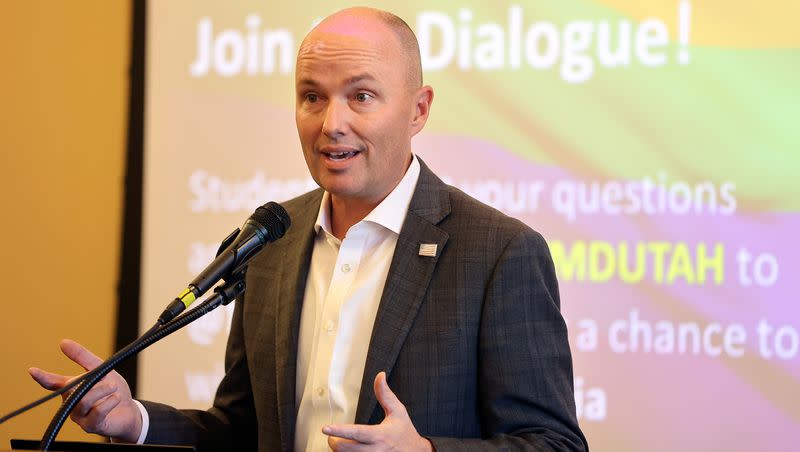With Congress on verge of fistfights, Gov. Cox champions civil discourse

- Oops!Something went wrong.Please try again later.
Tense disagreements on Capitol Hill boiled over Tuesday as U.S. lawmakers nearly came to blows on two different occasions.
Oklahoma Republican Sen. Markwayne Mullin challenged union president Sean M. O’Brien, with whom he had previously sparred verbally, to “finish it here” during a Senate hearing. Both men told the other to “stand your butt up” — to fight — before Vermont Sen. Bernie Sanders deescalated the situation.
Shortly before the Senate scuffle, former House Speaker Kevin McCarthy, R-Calif., was seen elbowing Rep. Tim Burchett, R-Tenn., in the back — their first interaction since Burchett voted to oust McCarthy in October. Burchett proceeded to run after the former speaker, according to witnesses, yelling, “You got any guts?” and “You need security, Kevin!”
McCarthy later denied “kidney punching” Burchett.
Meanwhile, Utah Republican Gov. Spencer Cox was speaking about countering toxic polarization with healthy dialogue at the second bipartisan gathering centered on his “Disagree Better” initiative as chair of the National Governors Association, where he was asked about the morning’s congressional clashes.
“This is a problem across our country,” Cox told reporters. “What we’re trying to do is encourage and inspire people to find a different path.”
Today in Denver, @GovCox will lead the second roundtable of his NGA Chair’s Initiative on the importance of healthy conflict. Learn more about the #DisagreeBetter initiative: https://t.co/HwmtA2EZfC pic.twitter.com/Izv50NYI9G
— NGA (@NatlGovsAssoc) November 14, 2023
While Cox was cautious to speak on behalf of members of Congress, he said the fact that politicians are engaging in physical altercations is a sign of a societywide inability to solve problems through critical listening and inclusive reasoning, which heightens the prevalence of political violence.
“Our elected leaders are a reflection of ‘We, the people,’” Cox said. “If we want to change this, we need to start changing what we post on social media every day, the way we engage with our own family members, of course, our college campuses. We can all do better at this.”
What did Gov. Cox say about ‘Disagree Better’?
Teaching the country’s younger generation how to better engage with different ideas and see interlocutors as individuals with good reasons for believing what they do — instead of as enemies — was at the heart of Tuesday’s event.
Cox hosted the daylong conference, consisting of multiple panels, Q&As and keynote addresses, with his vice chair, Gov. Jared Polis of Colorado. Montana Gov. Greg Gianforte and Oklahoma Gov. Kevin Stitt were also in attendance. The event took place at the Westin Westminster hotel outside of Denver, Colorado.
Far from being a feel-good messaging campaign, Cox says his mission to provide a model for thoughtful debate and productive pluralism is an urgent effort to address what he calls “the issue of our lifetime.”
“This is not just another civility initiative,” Cox said. “This is the only way we get it back together and save our country.”
After serving as vice chair of the National Governors Association last year, Cox took up the mantle of chairman in July. With the role came the opportunity for Cox to advertise and mobilize a yearlong initiative of his choosing.
Cox, who has made a name for himself highlighting bipartisan communication, chose “Disagree Better.”
Amid historic highs in feelings of negative partisanship between members of the two major political parties, Cox’s initiative aims to promote civil discourse, using the nation’s governors as examples through relatable videos, service projects and policy discussions.
Related
Gov. Cox, other governors plan to tackle immigration as part of ‘Disagree Better’ campaign
Utah Gov. Spencer Cox and Thomas Griffith speak about disagreeing better at Restore conference
Asked Tuesday about what constitutes success for the “Disagree Better” campaign, Cox said they were watching page views on a series of ads involving bipartisan pairings of governors, as well as media mentions and how many governors they could get to participate in their projects.
“Those types of metrics are really important. But ultimately this is work in the trenches,” Cox said.
According to Cox, the true indicator of success is less easy to gauge. However, he cited numerous instances when individuals had reached out to him, saying his initiative had enabled productive conversations between them and estranged friends or family members.
“That’s how we measure this,” Cox said. “It’s one person at a time.”
Teaching the next generation to ‘Disagree Better’
Tuesday’s conference focused on how young people can be given tools in college, or earlier, to avoid ideological capture and to learn how to engage in meaningful disagreement and, occasionally, surprising agreement, with their opponents without resorting to violence.
“If we can ground our young people in civic education and develop in them a sense of intellectual curiosity, humility, empathy and a willingness to see complexity, then we can gradually change the pervasive sense that people we disagree with are bad people or trying to destroy our country,” Cox said.
The event featured panel discussions with university administrators trying to reinvigorate higher education in America, youth leaders expanding opportunities for school debate programs and constitutional and educational scholars seeking to innovate solutions to the country’s problem of polarization.
Related

